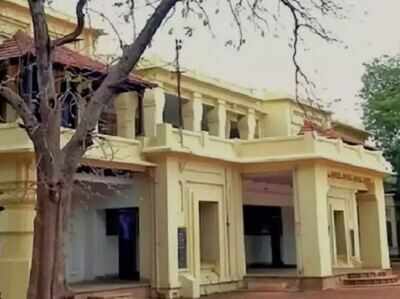Top Searches
- News
- City News
- kolkata News
- Row erupts in Visva Bharati over lecture on BJP’s defeat in Bengal
Row erupts in Visva Bharati over lecture on BJP’s defeat in Bengal

Visva-Bharati University
SANTINIKETAN: A notice on a lecture uploaded on the Visva-Bharati website on Tuesday went missing on Wednesday afternoon, hours after it was placed in the public domain.
The topic was “Why BJP failed to win West Bengal assembly elections”. VB, a central university, had invited Sanjay Kumar, co-director of Lokniti, a research programme at Centre for the Study of Developing Societies (CSDS), to deliver the lecture on May 18. Vice-chancellor Bidyut Chakrabarty was scheduled to preside over the lecture.
Accordingly, the joining link for the Zoom meeting was also in the public domain. This was the first time VB had arranged a lecture on an overtly political topic.
The notice was later nowhere to be seen on the VB website, without any official clarification from the university. But word went around the varsity that the lecture was “cancelled for the time being due to unavoidable circumstances”.
Phone calls and messages from TOI to VB public relations officer Anirban Sarkar didn’t elicit a response.
But the Prime Minister’s nominee to VB executive council, Dulal Chandra Ghosh, didn’t hide his dismay over the topic. “Visva-Bharati is an education institution. The university usually organizes lectures on education, society and international affairs. I don’t see any reason why a university has to organize a lecture on why a political party lost or won an election,” Ghosh said.
He further said that even the BJP leadership wouldn’t be comfortable with such a topic. “There is a university committee to decide on topic of lecture and speaker. I don’t know if the topic was discussed in that committee. I don’t think members were unanimous over the topic if the matter was placed in the meeting at all,” Ghosh said.
Excerpts of Sanjay Kumar’s post-poll survey are already in public domain in which Lokniti researchers have presented survey-based data on how voting pattern in Bengal (political affiliation-wise and a huge chunk of unattached voters) differed in the recently concluded assembly polls from the 2019 Lok Sabha polls.
The topic was “Why BJP failed to win West Bengal assembly elections”. VB, a central university, had invited Sanjay Kumar, co-director of Lokniti, a research programme at Centre for the Study of Developing Societies (CSDS), to deliver the lecture on May 18. Vice-chancellor Bidyut Chakrabarty was scheduled to preside over the lecture.
Accordingly, the joining link for the Zoom meeting was also in the public domain. This was the first time VB had arranged a lecture on an overtly political topic.
The notice was later nowhere to be seen on the VB website, without any official clarification from the university. But word went around the varsity that the lecture was “cancelled for the time being due to unavoidable circumstances”.
Phone calls and messages from TOI to VB public relations officer Anirban Sarkar didn’t elicit a response.
But the Prime Minister’s nominee to VB executive council, Dulal Chandra Ghosh, didn’t hide his dismay over the topic. “Visva-Bharati is an education institution. The university usually organizes lectures on education, society and international affairs. I don’t see any reason why a university has to organize a lecture on why a political party lost or won an election,” Ghosh said.
He further said that even the BJP leadership wouldn’t be comfortable with such a topic. “There is a university committee to decide on topic of lecture and speaker. I don’t know if the topic was discussed in that committee. I don’t think members were unanimous over the topic if the matter was placed in the meeting at all,” Ghosh said.
Excerpts of Sanjay Kumar’s post-poll survey are already in public domain in which Lokniti researchers have presented survey-based data on how voting pattern in Bengal (political affiliation-wise and a huge chunk of unattached voters) differed in the recently concluded assembly polls from the 2019 Lok Sabha polls.
FacebookTwitterLinkedinEMail
end of article
Top Stories Right Now
- indiaLive: India records 3.62 lakh Covid-19 cases, 4,120 deaths in last 24 hours
- indiaCovid-19: WHO warns variant in India could be highly contagious
- indiaStop price gouging by private suppliers, India tells China
- cityCovid: Karnataka now has most active cases in India
- sportsHow Gorsa returned India's favour by 'hosting' Zagreb camp
